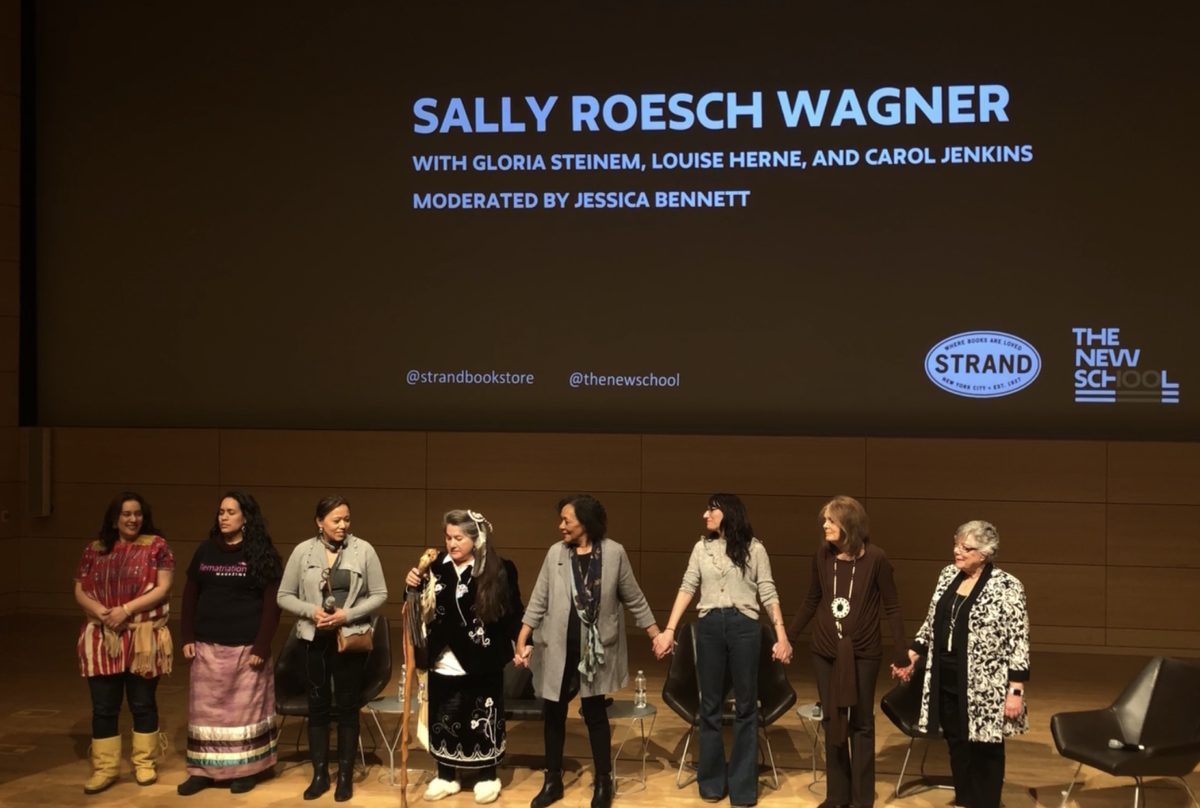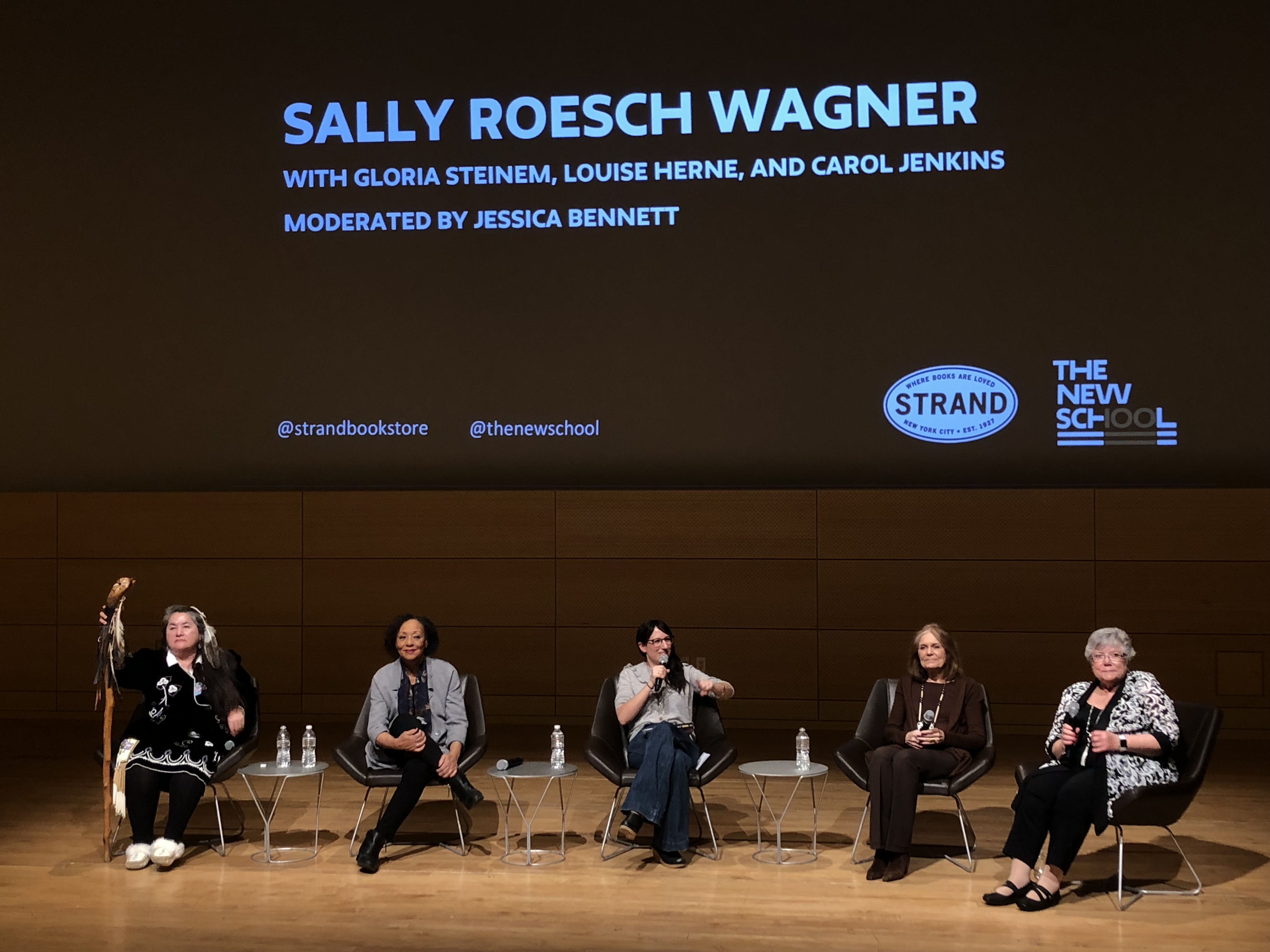There were laughs, cheers, applause and moments of silence. On the eve of International Women’s Day, intersectional feminism was on everyone’s mind — and right before their eyes — in The New School’s John L. Tishman Auditorium.
Iconic political activist Gloria Steinem appeared alongside feminist lecturer Sally Roesch Wagner, Emmy-award winning writer and producer Carol Jenkins, and third-generation Mohawk Bear Clan Mother Louise Wakerakats:se Herne on a panel about women’s history. Their discussion was moderated by Jessica Bennett, the first gender editor for The New York Times.
The event, hosted by the university’s Schools of Public Engagement and the nearby Strand Bookstore, was held as part of The New School’s centennial celebrations to honor International Women’s Month.
Gloria Steinem became a nationally recognized leader and journalist of the 1960s and 70s feminist movement. She also founded Ms. Magazine. Roesch Wagner is one of the first people to ever receive a doctorate in women’s studies and founded one of the first university-level women’s studies programs in the United States. Carol Jenkins is a writer, activist, and African Medical & Research Foundation chair. She was also the founding president of the Women’s Media Center, a non-profit “working to raise the visibility, viability and decision-making power of women and girls in media,” according to the organization’s website. Louise Wakerakats:se Herne is a legacy leader for the Spirit Aligned Leadership Program that aims to heal historical trauma, prevent violence against Native women and promote indigenous cultural expression.
Throughout the panel conversation, which was billed to last one hour but ran overtime, each activist shared her perspective on history’s importance. They touched on major themes including how to rewrite history, what vital minority voices are left out of women’s studies, and how today’s activists can begin to repair this erasure.
“We stand on the shoulderpads of the women who came before us,” Bennett said with a smile, “and these are them.” She kicked off the discussion with a game of what she called “feminist mythbusters,” an information-sharing activity she often employs on the Times’ gender Instagram page.
She asked Roesch Wagner if women’s rights began with voting rights suffragists.“That is a major myth!” Roesch Wagner replied. “Women had political voice on this land a thousand years ago, and that is not past tense. Louise [Herne] carries on a thousand-year-old tradition.”
Throughout the talk, each of the panelists highlighted the fact that Native women were autonomous for centuries. Herne shared stories of male warriors only being appointed through female confirmation, and Native women having equal say to men in both ancient and contemporary societies.
Bennett said she’d learned about Susan B. Anthony and Elizabeth Cady Stanton in her childhood education, but not about Native American women and their political power. Herne described the experience of being raised by older generations who embodied feminist beliefs. On International Women’s Day, she said it was crucial to “unveil something real old and absolute”: the power of Native American women.
Did white women lead the feminist movement? Bennett asked the panel to debunk another myth.
“After the last presidential election, when 96% of black women voted for Hillary Clinton and 51% of white women voted for the illegitimate accident of history, it should be clear that we have not properly represented the history of the women’s movement,” Steinem said. She encouraged modern feminists to study works by women of color involved in all feminist waves to ensure their voices are recognized. “They’re [white women] also erasing black women by not telling the stories of the women who have always, always been there,” Steinem said.
“The reason that women and especially women of color were not in history books was because they weren’t in the daily stories that were told, so they evaporated. There were many women of color who were totally engaged and fighting for it, only they never got the press. That remains true for much of today,” Jenkins said.
Jenkins added that “the movement for equality for women is essentially a women of color movement,” garnering loud applause.
Bennett asked what each of the activist’s “click moments” — the specific instances that inspired their feminist activism — were.
Roesch Wagner recalled writing a letter to her daughter about womanhood, which she opened on her 18th birthday. “When my daughter, Beth, was born, I wrote her a note about everything that I thought she should know,” she said. This was Roesch Wagner’s moment: Realizing that her daughter would experience womanhood in a completely different era, generation, and political period than what she had endured.
Jenkins talked about being raised in a feminist family, with her grandfather stressing the importance of education for their female family members. “My grandparents had 15 children, nine girls and six boys. It was my grandfather that sent all the girls to college, and this was Lowndes County, Alabama in the 1930s and ‘40s. We say it was that confidence and gesture that gave our family such strong roots,” she said, adding that she does her part in raising her grandchildren the same way.
Herne said her moment was “wisdom,” indicating not a specific incident that pushed her into activism, but the Native cultural wisdom that she said was more crucial to her current knowledge than any other education.
“Everything I do is founded on the fact that someday I won’t be here,” Herne said. “Imagine yourself sitting where we are. It’s not about what you gain in this life, it’s about what you’re going to leave behind.”
When microphones were made available to audience members, they asked how to cope with the 2016 election; how young women who aren’t of voting age could still be activists; and how non-binary womxn can truly make their voices heard.
Eradicating the electoral college was an all-encompassing answer from Steinem, as she spoke about its racist history, ties to slave owning, and utter inequality since its inception. Jenkins cited the Girl Scouts as an early memory of young female activism, and an example of a way younger women could still participate in democracy. Steinem also encouraged one audience member to converse with friends if she ever felt herself being undermined, undervalued, or having thoughts of self-doubt.
Steinem gave parting advice for today’s feminists, encouraging those in the room to acknowledge voices apart from their own. “If you’re in a group and you have more power than other people, you have to remember to listen as much as you talk,” she said. “And if you have less power, to talk as much as you listen.”

Then, as the evening came to a close, Herne invited three of her colleagues, who are affiliated with Rematriation Magazine, to join the panelists onstage. (The title of the publication is a word used by Indigenous women of Turtle Island whose primary goal is to return balance to the world, or “the Sacred to the Mother.”)
“I always talk about indigenizing, and the only way we can begin to do that is to share who we are. These are the powerful women I travel with and what I’m leaving behind,” Herne said. “I leave with great confidence, they are a powerhouse. I want to share the gift of song and medicine with all of you.”
Herne and her colleagues then sang a traditional song of prayer, as each of the panelists stood in the center of the stage holding hands.
In conversation with the Free Press after the event, Herne said that The New School student body should remember the importance of environmental activism and understand Native ancestry and their legacy.
“I always wish I were your age, and knew what I knew now,” Herne said. “I’d be so dangerous.”
“My biggest takeaway of this event,” Roesch Wagner told the Free Press, “is that this is what intersectionality looks like in practice.”







